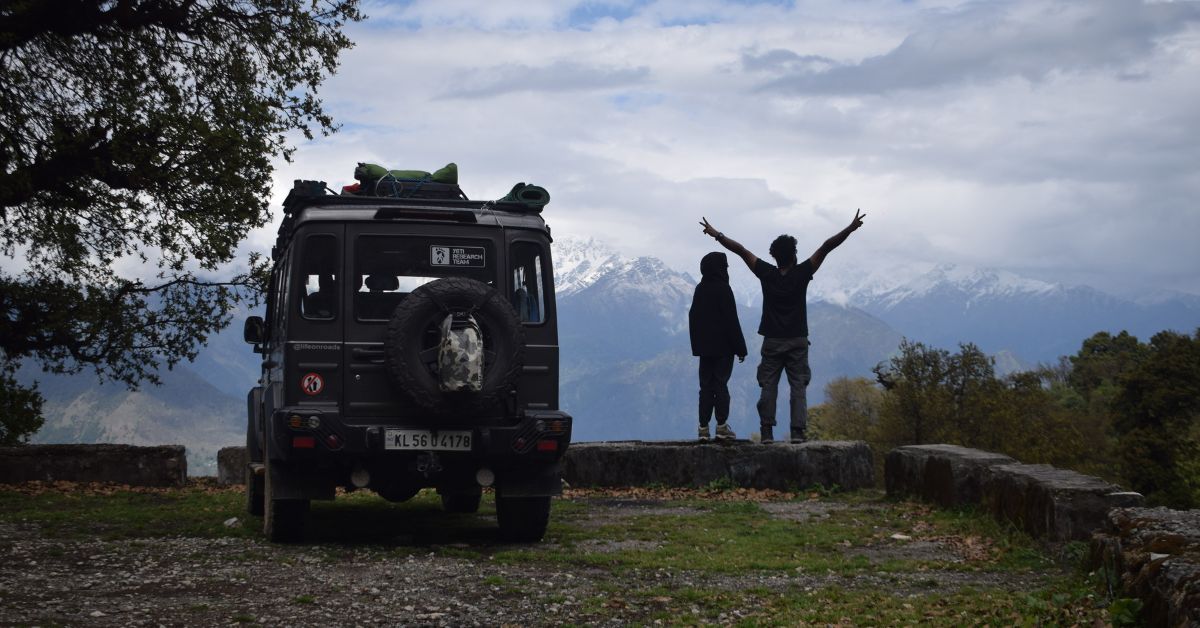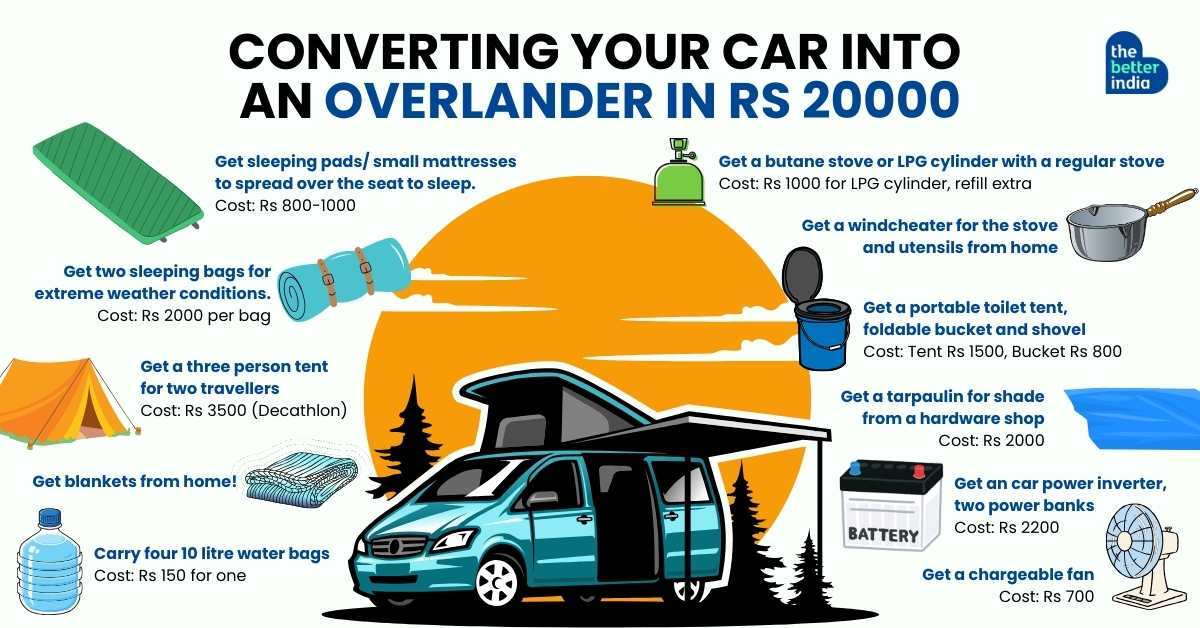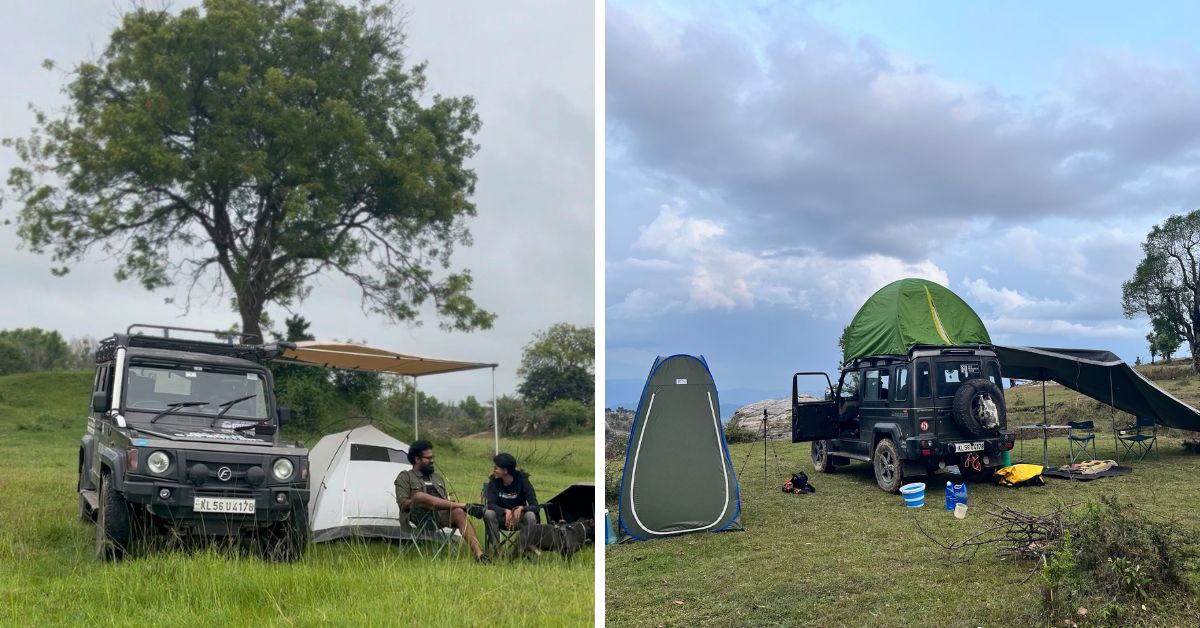Society often defines success as a high-paying job, a fancy car, and a comfortable life. But for Sangeeth and Kavya, a young couple from Kerala, this “perfect life” felt hollow. They craved new experiences and a connection with nature.
Fueled by a shared love for travel, they ditched their corporate jobs and comfortable lives to explore India in their 4×4 SUV. Over the past two years, they’ve become seasoned overlanders, travelling over 45,000 kilometres and documenting their journey on their Instagram handle, ‘lifeonroads_’, which boasts over 2.4 lakh followers.
For them, travelling has been the biggest teacher.
“No PhD or master’s degree can teach you what the roads can. We have evolved and learnt to live minimalistic. It grounded us. We meet people daily who are living on way less than all of us, and are the happiest,” says Sangeeth.
Being hit by the travel bug in college
Their story begins in their hometown of Pattambi, in Palakkad, Kerala, Sangeeth, a sales and marketing professional with an MBA, and Kavya, a dairy technologist, met in high school. College ignited their passion for travel, with regular expeditions of Sangeeth’s motorcycle. Weekend camping trips near Bengaluru, where both of them had moved to pursue their masters, further solidified their love for the outdoors.

“While we were in college, we used to go on two to three expeditions every year on my bike. We’d hit the road for about a month each year and loved it,” Sangeeth tells The Better India.
After college, they both worked in Bengaluru and began taking regular weekend trips.
Kavya recalls how they would drive on Saturdays, find a nice spot, and set up their tent for the night. This was their introduction to camping and overlanding, which intrigued them.
As they continued this routine, they discovered that this was the missing piece in their lives. Pursuing their love for travelling over weekends and holidays for over five years gave them the confidence and courage to consider longer trips and a possible life on the road.
“Before you attempt a big trip, you must try smaller ones to understand the challenges you might face. Take supplies for two trips and start camping. You may panic at first, but over time, you’ll find solutions. You will also realise whether you really enjoy it,” Kavya advises.
Initially, after the COVID-19 pandemic, they worked out of their car for almost two years. But travelling after 5 pm would be challenging; so they decided to quit their full-time jobs and started freelancing, which allowed them flexibility.
Five years and multiple trips later, they were ready for their biggest adventure yet — a one-year trip across the country with their dog, Drogo.
Getting ready for an overlanding
They purchased a Force Gurkha and converted it into their little home. Converting a car into a campervan costs Rs 2-3 lakh if done by a professional, but they aimed for an economical approach, completing the conversion themselves for just Rs 20,000. Their mantra was basic comfort, achieved through simple steps:

Travelling sustainably with a dog
Fifteen days after their marriage, they embarked on their most ambitious journey across the country. Starting early every day, they drive about 400-500 kilometres before finding a good spot to set up camp.
Their travels took them to remote villages and unexplored terrains across India, where they immersed themselves in local culture, connected with people from diverse backgrounds, and embraced the simplicity of life on the road. Equipped with a basic setup, including a portable power station, kitchen essentials, and a bathroom tent, they ventured into the unknown, driven by a thirst for adventure and a passion for sustainability.
“Once we find a place, we ask locals if it’s okay to camp there. After their approval, we set up our tent,” shares Sangeeth.
What sets them apart is their dedication to sustainability. They don’t eat out, preferring to cook for themselves every day. Kavya shares that they haven’t eaten out in over two years! Their daily expenses amount to Rs 200-300.
Hailing from a small town, sustainability was a way of life in both their households.
“I think the concept of sustainability and reuse is part of every middle-class family. We had cows and chickens at home. We even have a biogas plant where all the cow dung is sent. All the wet waste for our paddy field and vegetable garden. There is no waste sent out,” Kavya smiles as she briefly recalls her childhood.
Acknowledging that it isn’t possible to be 100 percent sustainable while travelling, they take small steps to minimise waste. They always carry a waste bag to collect all the waste from their campsite and dispose of it at the nearest bin. Since they don’t eat out or get takeaway, they are able to avoid plastic boxes and bags.
The couple has also observed the impact of climate change during their travels, prompting a new mission. Seven months ago, they decided to plant 10,000 saplings across India.
“The last three summers have been extremely hot, making staying outdoors very difficult. We wanted to take some steps to remedy this. Each of us needs to take some steps to fight climate change,” says Sangeeth.
They’ve successfully planted these 10,000 saplings, and now they have a loftier ambition: to plant one lakh saplings over the next five years.
How travelling changed their perspective
What sets this couple apart is their approach to travel. They go to remote locations, shunning the typical ‘touristy’ places. The idea is to explore the unexplored. This mindset shift has led to profound realisations about the world.
When asked about their favourite location, the couple unanimously picks Madhya Pradesh for its natural beauty and welcoming nature.
“Our dream has evolved over the years thanks to our experiences. People have been incredibly welcoming and loving, even in the most remote villages. It made us realise that no barriers or borders should stop you,” Sangeeth shares.
The couple recounts an interesting experience in Madhya Pradesh when they were camping outside a village.
“Since we had our tent set up and were using our camera to shoot some pictures, many curious villagers approached us and wanted to know who we were. They thought we were celebrities. The entire village gathered by the next morning, eager to speak to us,” Sangeeth laughs.
Of course, travelling for extended periods and camping outdoors comes with its own set of challenges. For Kavya, this often means waking up at 4 am to find a good bathroom or dealing with the constant stares of men. Camping in the open also invites wildlife encounters; they’ve even had visits from leopards!
“We once camped in Munsiyari, Uttarakhand, in an open, isolated area. Our dog Drogo sensed something approaching and started to panic. Our car has motion sensor lights that attracted a leopard. It came very close, and we couldn’t sleep that entire night. When we spoke to the villagers the next day, they said he is a regular visitor,” says Sangeeth.

In other instances, they have abandoned camps in the middle of the night due to nearby wild animals.
Despite all the challenges, they persevere. Why?
“Travelling is the best learning experience. It teaches you something new every day and gives you the freedom to choose what you want. You also learn to enjoy your own company when you are outdoors,” says Sangeeth.
“Our happiness quotient is high when we travel,” Kavya adds.
Sharing their experiences online also provides them with support. “We’ve built a community that supports and encourages us. We do experience mental breakdowns sometimes; being alone on the road can lead to self-doubt. But meeting people or seeing positive comments on social media gives us the boost to keep going.”
Their dog Drogo is also a big pillar of support, providing comfort and alerts during dangers.
Looking ahead, they hope to explore more parts of the country while continuing their mission to plant saplings. “True happiness is not in the money you earn, but in the experiences you gather. We may be earning less than others, but we’re high on life,” shares Kavya.
What do you want to collect: money, memories, or both?
Edited by Arunava Banerjee, Images Courtesy Sangeeth
No comments:
Post a Comment